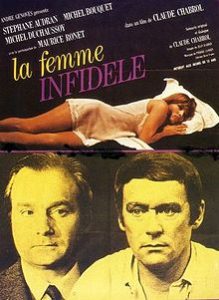La Femme Infidele-1969
Director Claude Chabrol
Starring Stephane Audran, Michel Bouquet
Scott’s Review #397
Reviewed April 23, 2016
Grade: A-
Another gem by French director Claude Chabrol, La Femme Infidel (The Unfaithful Wife) is a 1969 film later remade in the United States in 2002, directed then by Adrian Lynde.
Having seen the remake a few times before watching the original, I cannot help but compare the two films, which in itself is fun for me since both films are vastly different from one another, especially as I find myself further pondering each.
One is more conventional- the other more psychological.
Successful insurance executive Charles Desvallees lives in the suburbs of Paris with his beautiful wife Helene and their young son.
Life is seemingly idyllic, as they enjoy every luxury imaginable beautiful house with a beautiful landscape and a dutiful maid.
Charles has a sexy secretary, smokes, drinks, and enjoys life at work and Helene frequently goes to Paris for shopping sprees, beauty treatments, and to attend the cinema.
What could be missing from their lives? Helene is a bored housewife and has embarked on an affair with Victor Pegalla, a writer who lives in Paris.
When Charles grows suspicious of Helene, he hires a private investigator to track her activities and reveal the true story of how she spends her time.
Admittedly, I was highly influenced by Unfaithful, the 2002 remake starring Diane Lane and Richard Gere when I viewed La Femme Infidel.
The remake is set in New York instead of Paris and is more polished and less psychological- a Fatal Attraction-type slick thriller if you will.
The “other man” is much sexier and more passionate, and the connection is more primal than in the original. This changes the tone of the film from a sexual and lustful one to a more complex and psychological dynamic- La Femme Infidel is a more thinking man’s film.
Victor is handsome and well-groomed, but he is rather similar to Helene’s husband, so we wonder what the main appeal is- if she is seeking adventure.
Lane’s 2002 character’s choice is easy- her affair is based on the physical attractiveness of the man. 1969’s Helene is not having her affair for that reason-, the reasons, besides boredom, are unclear, making the film more complex.
When the main action (death) occurs at the midway point, the film goes in a different direction and becomes complicated. No longer is the main plot of Helene’s adultery, but rather what Charles has done and the repercussions bound to follow.
Do we see Charles as the villain and Helene as the victim? Who do we feel sorry for? Do we root for anyone? Certainly, the character of Victor is not explored in much depth. What are his motivations? Is he in love with Helene?
Helene is an interesting character. Is she meant to be sympathetic or hated? Or just complex? One can interpret her in different ways- the woman has it all beauty, a faithful husband, and a wonderful home life- why does she risk sacrificing it all for a fling?
Does she dare to want more out of her life and have some adulterous fun? It does not seem that Helene is in love with Victor or has any desire to run away with him or leave her husband.
Charles is also a character to be analyzed closely.
Throughout the film’s first portion, he is seen as a victim- his gorgeous wife has mysterious contempt for him and plays him for a fool. She spends his money and cheats on him, while he adores her and resists his young, flirtatious secretary, who has a thing for Charles and wears short skirts seemingly for his benefit.
She is much younger than Helene. Later, his character’s actions and motivations shift from victim to arguably brutish and primal. A momentary outburst changes his motivations and the texture becomes calculating.
In the end, Charles and Helene come together and resume normalcy in their lives, but will things ever be the same? Will the trust ever reappear in their lives? Is Helene now afraid of or intimidated by her husband or rather, does she now have a newfound desire for her alpha, take-charge husband?
The 1969 version of La Femme Infidel is layered, complex, interesting, and left me thinking about the film and that is a very good sign.
The remake, while very good, is more of a blockbuster, produced kind of film, while the original goes more for thought.
The lack of sex appeal in Victor is a negative of the film as are his motivations, but the character-driven nuances of the other characters make this a thought-provoking watch.
